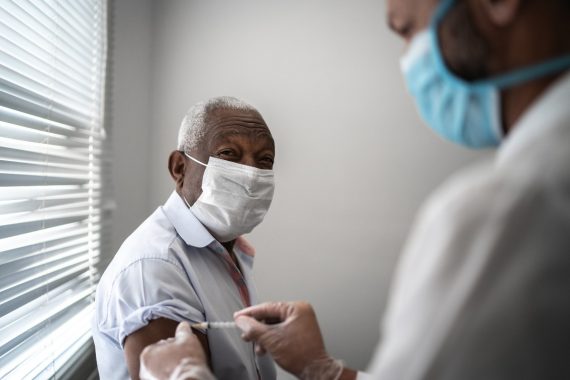Covid-19 vaccine rates lower among ethnic minorities, disabled people and in deprived areas

Take-up of a Covid-19 vaccine has been lower among all ethnic minority groups compared with the White British population, figures show.
Lower uptake has also been seen among some religious groups, disabled people and those living in more deprived areas, the Office for National Statistics (ONS) said.
Reasons for lower vaccination rates are likely to be complex but modelling showed could not be fully explained by geography, socio-demographic factors or underlying health conditions, the ONS report concluded.
It comes as other figures show vaccine hesitancy in England remains low overall but is higher in younger age groups, people in deprived areas and Black adults.
A study exploring the reasons for vaccine refusal and uncertainty in more depth is due to be published soon, the ONS said.
Figures on vaccination rates for first doses in the over 50s in England show that the lowest uptake was among people identifying as Black Caribbean and Black African (66.8% and 71.2%), followed by people from Pakistani backgrounds (78.4%).
The data analysis also showed that vaccination rates differed by religious affiliation with the lowest rates among those identifying as Muslim (78.8%) and Buddhist (83.3%).
Other factors were found to play a part in vaccine uptake, including language and deprivation. And there was a disparity in vaccination rates among disabled people who reported being ‘limited a lot’ in their day-to-day activities (89.3%) compared with those who were non-disabled (92.3%) and was greater among those aged 50 to 69 years than those aged 70 years and over, the ONS said.
GPs have been praised recently for their efforts in improving uptake of Covid-19 vaccination among ethnic minority groups after an uptick between February and April.
In a Downing Street press conference, NHS England director of primary care Dr Nikki Kanani said there had rightly been concern about uptake among those from ethnic minority backgrounds but progress had been a ‘direct result of a combination of NHS teams who know and understand their communities, community and faith leaders who’ve worked really closely with us’.
Initiatives to boost uptake have included the setting up of drop-in clinics and phone calls from the GP to help address patients concerns.
In a separate survey of 16,362 adults aged 16 years and over in Great Britain between 31 March and 25 April, 93% of adults reported positive sentiment towards the vaccine.
Hesitancy towards the vaccine in general, which includes those who have decided not to get the jab or report being very or fairly unlikely to get it if offered, has not changed significantly since the last survey, the ONS said.
When broken down by age, 13% of adults aged 16 to 29 years reported vaccine hesitancy, the highest of all age groups.
And the figures also showed that one in three Black or Black British adults reported vaccine hesitancy as did 12% of adults in the most deprived areas of England compared with 4% in the least deprived.
Long-term effects on health, side effects and how well the vaccine works were the top three reasons for reporting negative sentiment towards the vaccine.
Hugh Stickland from the ONS said: ‘Vaccination rates in the over 50s in England are lower in all ethnic minority groups compared with their White British counterparts, with the lowest rates in those who identify as Black Caribbean and Black African.
‘Lower vaccination rates were also observed in those who identify as Muslim, disabled people, and those living in more deprived areas.
He added: ‘This is broadly similar to the groups who express vaccine hesitancy. However, the reasons for lower uptake are likely to be complex, including for example being unable to travel to a vaccination centre.’
Dr Farzana Hussain, a GP in Newham said GP practices had a vital role to play in increasing vaccine uptake in BAME and deprived communities because if the trust of a message coming from a family doctor.
She had boosted the uptake in her own practice by calling patients individually.
‘It is important to listen to concerns rather than telling people to take the vaccine. Most people are frightened of the vaccine for a variety of reasons and it is important to acknowledge this fear and not dismiss it and then work with the facts and let people make their own decisions and not force them.’
Pulse October survey
Take our July 2025 survey to potentially win £1.000 worth of tokens

Visit Pulse Reference for details on 140 symptoms, including easily searchable symptoms and categories, offering you a free platform to check symptoms and receive potential diagnoses during consultations.










